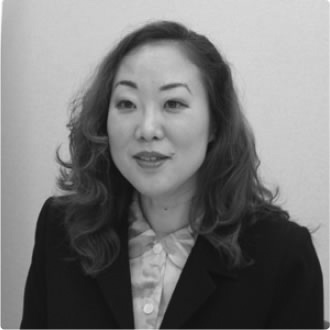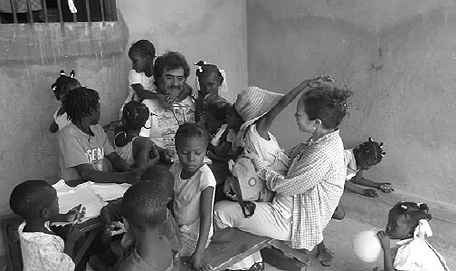Japan's Official Development Assistance White Paper 2011
Column 12
Assistance that Encourages "Recovery of the Heart"
—Interview with NGO JEN Trustee and Secretary General Keiko Kiyama—

Ms. Kiyama, Trustee and Secretary General, JEN (Photo: JEN)
The following is an interview with Ms. Keiko Kiyama, Trustee and Secretary General of the non-governmental organization JEN, which assists regions of conflict and disaster in Japan and abroad.
You have been involved in assisting people in regions of conflict and disaster for many years. What is the focus of your activities? Where do you pour the most energy?
In conflicts and disasters, people lose more than material possessions. In the course of providing assistance, I became strongly aware of the importance of things you can't see with the eye but are essential to people's lives. There are many such things—love, bonding, gratitude, dignity, confidence, knowledge, philosophy, and so on. Some people are too deeply distressed to feel these things, and they can't take the first steps toward reconstruction. On top of healing their wounds and providing them with food and a place to take shelter from the rain, I’ve poured my energy into addressing basic human livelihood by restoring their dignity and helping them to regain self-support. That is, in any assistance project, I've tried to incorporate elements of "recovery of the heart" and "regeneration of the community." This may sound time-consuming, but people who have recovered their dignity never back down, so reconstruction continues even after we leave. This is a huge advantage.
What project in the past produced the most remarkable results?
Around 2000, we had a project in the former Yugoslavia (amid raging conflict between ethnic groups) called Sheep Bank. We distributed six pregnant ewes to each family, and as "interest" on their loan, asked the families to donate three lambs to other refugees. About four years after the project was completed, I went back to see how the families were doing, and I was moved that they had grown a vast flock of sheep. Each family was caring for some 30 sheep. Through the project, they studied how to breed and raise the sheep, and also how to earn a living. Not only was this a success, but the idea of providing lambs to other displaced people worked out remarkably well too. At the time the project started, these people were in such great sorrow that they could hardly say hello. But they did a marvelous job of regenerating their community, and they were even supporting others who shared their plight.
JEN was one of the first to rush over and offer assistance in the Chuetsu earthquakes in Niigata Prefecture and the recent Great East Japan Earthquake in the Tohoku region. What is unique about JEN's activities?
To be honest, I never thought our experience abroad would come in so handy in Japan. Regardless of location, it's important to respect the region's culture and customs, and encourage the local people to play a central role in the activities. I believe people have the power to support themselves even in the worst of situations. JEN's activities are unique because they work to draw out this power. In Niigata, we continued to send volunteers to a small village with hopes of encouraging youths to settle there and mitigate depopulation. But only because the villagers welcomed our help were we able to support them.
The "ODA Review" released by the Ministry of Foreign Affairs (MOFA) requires Japan's ODA to strengthen collaboration with NGOs. What do you expect from development cooperation in the future?
To me, a good collaborative relationship not only leverages each other's strengths but also produces new outcomes and discoveries for both parties. Building this relationship will take eons if the NGO merely made a request and MOFA gave out the money. To come up with really effective projects that make good use of one another's unique strengths through close communication, both parties need to work at building a mature relationship, where they can offer constructive criticism and talk matters through and put different ideas into practice. I hope JEN can be a true partner to various stakeholders. After all, though each may have a different way of thinking, we all share the same goal—to aim for a world free of poverty and war.

Ms. Kiyama visiting an orphanage in Haiti (Photo: JEN)
